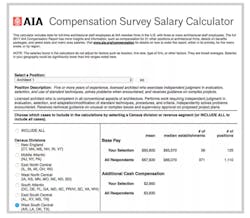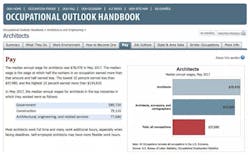An Architect’s Salary
It was only a matter of time before I once again tackled the topic of an architect’s salary. This is actually the fourth post I’ve prepared on the subject, but I haven’t talked about it since January 2013 so maybe it was overdue. I have long been on record that I can’t stand when architects complain that they don’t make more money. Of course they want to make more money – who doesn’t? The question – for me – is what are you willing to do to get more money because people generally don’t like to give that stuff away. I also strongly believe that each person needs to determine for themselves where the balance exists between work and personal fulfillment.
… but that’s me and things have changed since I was an employee. I have now moved to the proverbial “other side of the table” and it has shaped how I view the process of determining how much money people should be paid. So let’s get into it and start a conversation on ‘An Architect’s Salary.’
I love Money [00:58 mark]
Everyone wants to make more money – this is a universally true statement and is not unique to architects. I feel absolutely confident when I say that no matter how much money you currently make … you would like to make more.
“I Won’t Tell the Whole Story, but …” (Golden Handcuffs) [11:41 mark]
This was at a time early in my career (I was working at my second architectural job) and I was bored at my current job so I thought I would quit my job and come work for this apparently awesome architectural firm (I will refer to them as “cool building firm”). The economy was going great in 1997 and finding a job was not particularly difficult. Despite my obvious talents, the only requirement needed to find a job was “breathing”. So I sent in my resume, had an interview, and 2 weeks later (after my night-time creeping around) I was now an employee at “cool building firm.” I did do a little research on what they did and it seemed slightly interesting … but when they offered me a raise of 36% over my old salary I said yes on the spot. [the entire article here]
Worth Vs. Value [17:45 mark]
I want to make more money … what’s that based on? How do you determine your worth, and how do you determine your value? From where I now sit, and for the sake of this conversation, let’s pretend I am your employer – I can determine your value, but I can’t determine your worth … that’s up to you.
When I am determining your value, I go through a list of questions to help me come to this number. These questions, at the very least, would include; How much experience do you have, are you licensed, how much can I charge for your time, how effective are you, how much one hour spent working is constructive versus how much is spent learning the task, etc.
When you are determining your worth, you would consider those same questions, but you would also consider things like, are you a good person, do you fit into the culture of the office well, how involved do you get in the community, are you a good representative of the firm, do you show up for work, etc. While these are all important questions and they certainly have a role to play, they are much harder for your employer to quantify and assign a numerical value. An additional consideration is that the items that go into defining your worth are portable – meaning these are things that will go with you regardless of where you work.
AIA Compensation Calculator [24:37 mark]
The American Institute of Architects send out a massive employment survey every few years and they take the data returned to them by the respondents and builds a “salary calculator” which is readily available and free for all to use. Interested to know what someone in your experience bracket and in your part of the country makes? This is the first place you need to visit. [here]
Glassdoor, Architable [30:06 mark]
There’s still a construction fence around this website, but if you have a helpful, enlightening, or just plain crazy interview story, Landon’s buddy Adam is building a database to help out fellow architects and architects-to-be. With a more tailored approach, his hope is to provide some deeper insight into the experiences around interviewing and assessing your value in the architectural field.
Pulling Back the Curtain [35:49 mark]
Until I started getting involved in the day-to-day operations of a firm, I didn’t think much about how money flows through an office. All I cared about was how much I was making and did it align with how I perceived my worth. In this section, I take a few minutes to walk you through the some of the variables that help determine what a firm considers when setting a salary. Most people are shocked when they learn that their salary only represents a small portion of the expense associated with their total cost center.
Takeaway: We Do Alright and Assess your Intangibles [48:04 mark]
How much does an architect make? Well, we do … okay. The starting level salary appears to fluctuate slightly based on a handful of nuanced variables but as of this writing, and for someone right out of school, the salary ranges between $40,000 and $46,000 depending on what part of the country you live in. ** During the recording of the podcast, I stated an incorrect fact that I feel is necessary to correct. There are actually more licensed attorneys in the State of New York than all the licensed architects in the US combined. I said Chicago had more and that was wrong … which is why I come back later and fact-check these things.
Dept. of Labor and Statistics [53:22 mark]
The US Government Bureau of Labor and Statistics has an Occupational Outlook Handbook where you can go find out all sorts of information regarding architects … and attorneys, and whatever vocation you want to explore.
$57,430 bottom for attorneys and $119,250 is the median. $47,480 is the bottom 10% for architects and the median is $78,470. It looks bad with you simply skim the numbers, but if you look a bit deeper into the data, you get a different story. There are approximately 1,340,000 attorneys in the United States to only 113,000 architects. Their bottom 10% is larger than our entire count.
In My Spare Time? [58:28 mark]
We are back with another hypothetical question – a question with another seemingly easy premise …
But is it really so easy?
It’s always a good idea to have a general understanding of how much you are worth. For most people, and up to a period of time fairly recently, I would consider myself in the “most people” category, think their salary is purely based on the optics of the office they work in and the scientific method of asking around to see what their friends make. Shockingly, neither of these methods are crazy but you would be well served to have a better understanding of all the moving parts that a firm goes through when determining the value (and subsequently the salary) of their employees. There are plenty of architects that make a great living and there are all sorts of things that contribute to that – particularly if you have a skill that is in demand and isn’t readily replaceable by a cheaper source. The point I hope comes across is that getting paid what you think you are worth in an environment that recognizes your value is a wonderful thing and should be your goal, not I went to school a long time and took a bunch of hard tests and I don’t make what Lawyers or Doctors make – if you want their salary, go do their job.








